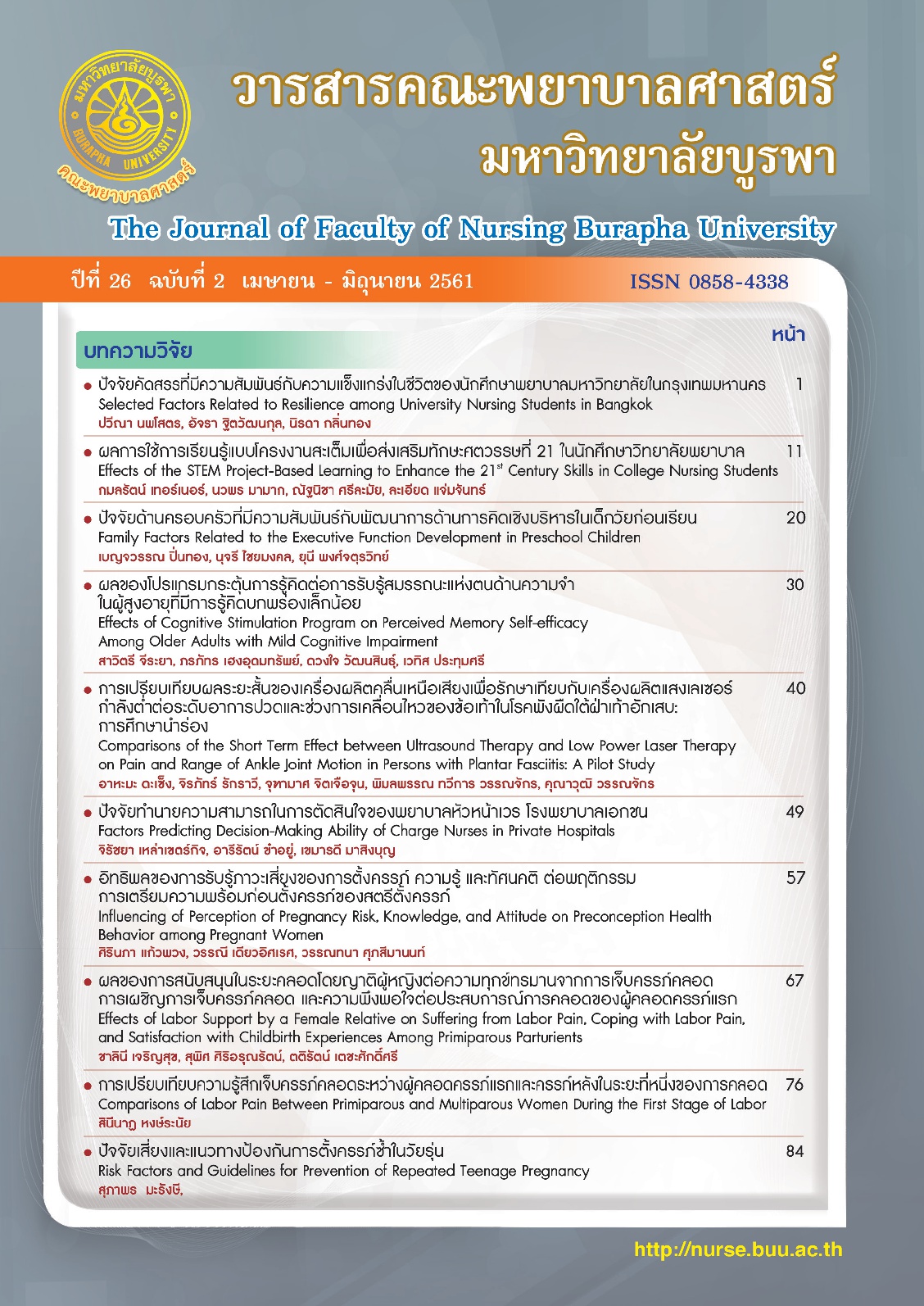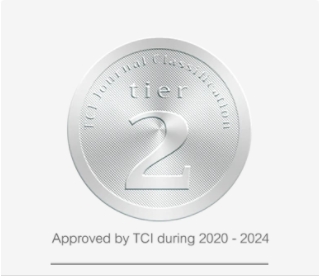ผลของโปรแกรมกระตุ้นการรู้คิดต่อการรับรู้สมรรถนะแห่งตนด้านความจำ ในผู้สูงอายุที่มีการรู้คิดบกพร่องเล็กน้อย
คำสำคัญ:
โปรแกรมกระตุ้นการรู้คิด, การรับรู้สมรรถนะแห่งตนด้านความจำ, ผู้สูงอายุ, การรู้คิดบกพร่องเล็กน้อยบทคัดย่อ
บทคัดย่อ
การวิจัยแบบกึ่งทดลองนี้มีวัตถุประสงค์เพื่อศึกษาผลของโปรแกรมกระตุ้นการรู้คิดต่อการรับรู้สมรรถนะแห่งตนด้านความจำในผู้สูงอายุที่มีการรู้คิดบกพร่องเล็กน้อย กลุ่มตัวอย่างคือ ผู้สูงอายุในเขตอำเภอพนัสนิคม จังหวัดชลบุรี ที่มีการรู้คิดบกพร่องเล็กน้อยจากการประเมินโดยใช้แบบประเมินพุทธิปัญญาและมีคุณสมบัติตามที่งานวิจัยกำหนด จำนวน 23 คน สุ่มเข้ากลุ่มทดลอง จำนวน 11 คน และกลุ่มควบคุม จำนวน 12 คน กลุ่มทดลองได้รับโปรแกรมกระตุ้นการรู้คิด จำนวน 8 ครั้ง สัปดาห์ละ 2 ครั้ง ส่วนกลุ่มควบคุมได้รับการดูแลตามปกติ เก็บรวบรวมข้อมูลระหว่างเดือนเมษายน ถึงเดือนมิถุนายน พ.ศ. 2560 เครื่องมือวิจัยคือ แบบสอบถามสมรรถนะแห่งตนด้านความจำ ได้ค่าความเชื่อมั่นเท่ากับ .96 วิเคราะห์ข้อมูลโดยใช้สถิติพรรณนา การทดสอบที และการวิเคราะห์ความแปรปรวนแบบวัดซ้ำ
ผลการศึกษาพบว่ากลุ่มทดลองมีคะแนนเฉลี่ยการรับรู้สมรรถนะแห่งตนด้านความจำมากกว่ากลุ่มควบคุมอย่างมีนัยสำคัญทางสถิติ (F1,21 = 7.69, p < .05) และในกลุ่มทดลองมีคะแนนเฉลี่ยการรับรู้สมรรถนะแห่งตนด้านความจำในระยะติดตามผล 1 เดือน ( = 83.27, SD = 14.32) สูงกว่าระยะหลังการทดลอง ( = 79.41, SD = 16.58) และระยะก่อนการทดลอง ( = 57.23, SD = 24.17) อย่างมีนัยสำคัญทางสถิติ ผลการวิจัยแสดงให้เห็นว่าโปรแกรมกระตุ้นการรู้คิดนี้มีประสิทธิภาพ พยาบาลและบุคลากรทีมสุขภาพที่เกี่ยวข้องสามารถประยุกต์โปรแกรมนี้เพื่อส่งเสริมการรับรู้ของผู้สูงอายุในด้านความสามารถแห่งตนด้านความจำ
References
therapy to other cultures. Clinical Interventions in Aging, 9, 1003 - 1007.
Aguirre, E., Woods, R. T., Spector, A., & Orrell, M. (2013). Cognitive stimulation for
dementia: A systematic review of the evidence of effectiveness from randomized
controlled trials. Ageing Research Reviews, 12, 253 - 262.
Bandura, A. (1997). Self-efficacy: The exercise of control. New York: W. H. Free.
Bandura, A. (1989). Regulation of cognitive processes through perceived self-efficacy.
American Psychological Association, 25(5), 729 - 735.
Berry, J. M. (1999). Memory self-efficacy in its social cognitive context. In T. M. Hess &
F. Blanchard-Fields (Eds.), Social Cognitive and Aging. San Diego, CA: Academic Press.
Boonngam, L., Toonsiri, C.. & Junprasert, C. (2017). Effects of the Qigong exercise program on
blood pressure levels among prehypertensive women in Meuang District, Sing Buri
province. The Journal of Faculty of Nursing Burapha University, 25(1), 82-94. [In Thai]
Braverman, E. & Scali, B. (2015). Reverse mild cognitive impairment. In Life Extension
Magazine. Retrieved from http://www.lifeextension.com/Magazine/2015/3/Reverse-Mild-Cognitive-Impairment/Page-01
Burns, A., & Zaudig, M. (2002). Mild cognitive impairment in older people. Lancet, 360,
1963 - 1965.
Chattrawongwiwat, T., Kong-in, W., & Thaniwattananon, P. (2013). Impacts of a memory- enhancing programme on perceived memory self-efficacy amongst elderly people. Thai Journal of Nursing Council, 28(2), 98 - 108. [In Thai]
Ferna´ndez-Prado, S., Conlon, S., Maya´ n-Santos, J. M., & Gandoy-Crego, M. (2012). The
influence of a cognitive stimulation program on the quality of life perception among
the elderly. Archives of Gerontology and Geriatrics, 54, 181 - 184.
Forstl, H., & Kurz, A. (1999). Clinical features of Alzheimer's disease. European Archives of
Psychiatry and Clinical Neuroscience, 249, 288 - 290.
Hengudomsub, P., Kangchai, W. & Pathumarak, N. (2011). Physical and mental health
relationships in community-dwelling older adults, The Journal of Nursing Burapha
University, 19 (Suppl 2), 107-118. [In Thai]
Hemrungrojn S. (2011). MoCA Thai version 2007. In MoCA Montreal - Cognitive Assessment.
Retrieved from https://www.mocatest.org/wp-content/uploads/2015/tests-
instructions/MoCA-Test-Thai.pdf
Mah, L., Anderson, N. D., Verhoeff, N. P. L. G., & Pollock, B. G. (2017). Negative emotional
verbal memory biases in mild cognitive impairment and late-onset depression. The
American Journal of Geriatric Psychiatry, 25(10), 1160 - 1170.
McDougall, G. J., Becker, H., Pituch, K., Acc, T. W., Vaughan, P. W., & Delville, C. L. (2010).
The senior WISE study: Improving everyday memory in older adults. Archives of
Psychiatric Nursing, 24(5), 291 - 306.
Mitchell, A. J., & Shiri-Feshki, M. (2009). Rate of progression of mild cognitive impairment to
dementia: Meta-analysis of 41 robust inception cohort studies. Acta Psychiatrica
Scandinavica, 119(4), 252 - 265.
Muangpaisan, W. (2016). Burden of dementia. in W. Muangpaisan (Ed.) Dementia: Prevention,
Assessment and Care (4thed). Bangkok: Mahidol University. [In Thai]
Nasreddine, Z. S., Phillips, N. A., Bedirian, V., Charbonnean, S., Whitehead, V., Collin, I.,
Cummings, J. L., & Chertkow, H. (2005). The Montreal Cognitive Assessment, MoCA: A
brief screening tool for Mild Cognitive Impairment. Journal of the American Geriatrics Society 53(4), 695-699.
Polit, D. F., & Hungler, B. P. (1995). Nursing research: Principles and methods. Philadelphia:
Lippincott.
Prasat Neurological Institute. (2008). Clinical Practice Guideline for Dementia. Bangkok,
Thailand: Pimrak. [In Thai]
Snijders, A. H., Van de Warrenburg, B. P., Giladi, N., & Bloem, B. R. (2007). Neurological gait-
disorders in elderly people: clinical approach and classification. The Lancet
Neurology, 6(1), 63 - 74.
Spector, A., Thorgrimsen, L., Woods, B., Royan, L., Davies, S., Butterworth, M. & Orrel M.
(2003). Efficacy of an evidence-based cognitive stimulation therapy programme for
people with dementia: Randomised controlled trial. The British Journal of Psychiatry,
183(3), 248 - 254.
Suwanmosi, P., & Kaspichayawattana, J. (2016). The effects of cognitive stimulation program
on the memory of community-dwelling older persons with mild cognitive impairment
living in community. Journal of the Police Nurses, 8(2). 45 - 57. [In Thai]
Valentijn, S. A., van Hooren, S. A., Bosma, H., Touw, D. M., Jolles, J., van Boxtel, M. P., &
Ponds, R. W. (2005). The effect of two types of memory training on subjective and
objective memory performance in healthy individuals aged 55 years and older: A
randomized controlled trial. Patient Education and Counseling, 57, 106 - 114.
West, R. L., Bagwell, D. K., & Dark-Freudeman, A. (2008). Self–efficacy and memory aging:
The impact of a memory intervention based on self–efficacy. Aging Neuropsychology
and Cognition, 15, 302 – 329.
West, R. L., & Yassuda, M. S. (2004). Aging and memory control beliefs: Performance in
relation to goal setting and memory self-evaluation. Journal of Gerontology:
Psychological Sciences, 59(2), 56 - 65.





